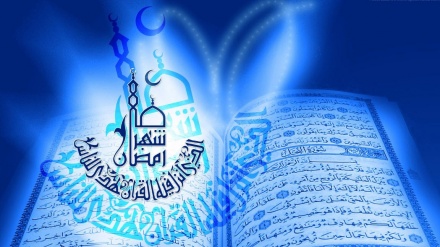Blessed Month of Ramadan
Faith forms the foundation of mankind’s acts. Faith is defined as truly embracing a reality. Mankind only works hard if he truly believes in something. This fact is what distinguishes faith from knowledge. At times, mankind is aware of something, but is not wholeheartedly devoted to it. So, maintenance of knowledge is insufficient for establishment and maintenance of one’s faith.
We have reached the last ten days of the holy month of Ramadan, which includes the Night of Qadr. The hidden aspect of the Night of Qadr compels Muslims to worship God, recite ayahs of Holy Quran and pray to God on the eves of the last ten days of the holy month of Ramadan. If the actual date of the Night of Qadr would have been specified, many people would have just prayed to God on that night and would have not benefitted from the virtues of prayers in other nights. Now that the exact date of the Night of Qadr is not specified, the faithful pray to God and repent throughout all the nights which could be the Night of Qadr, and are spiritually rewarded to a larger extent. It has been cited that the Prophet of Islam retreated for the worship of God in the last ten days of the holy month of Ramadan. The Prophet of Islam noted that the spiritual reward of Etekaaf (retreating in order to worship God) is tantamount to the spiritual rewards gained via observation of two Major and two Minor Hajj Pilgrimages. Upon the arrival of the last ten days of the holy month of Ramadan, the Prophet of Islam completely prepared himself for worship of God and observation of prayers.
According to Holy Quran, Etekaaf (Seclusion in a mosque in order to worship God) was considered as one of the divine rituals in the Sharia of Prophet Abraham and the followers of Prophet Abraham retreated at holy sites in order to worship God. Hazrat Solomon also carried out this divine ritual in Bait al-Moqaddas. Prophet Moses, who shouldered the responsibility of leadership and guidance of his Ummah also left his Ummah for a while, and retreated in Mount Sinai, to worship God. Hazrat Zachariah was the caretaker of Motakefs (Those who retreat at a holy site in order to worship God), in Bait ul-Moqaddas. Also, Virgin Mary was the caretaker of Etekaaf rituals.
The Prophet of Islam retreated at Cave Hera in order to worship God. After the start of his prophet hood and his migration to Medina, the Prophet of Islam retreated at Al-Nabi Mosque, worshipping God.
Etekaaf raises a highly appropriate opportunity for mankind, who has been mired in the materialistic manifestations of the world. Motakefs, in order to benefit from spiritual values, lose their materialistic interests for while in order to establish a close bond with God. The first outcome of Etekaaf is the honoring of Motakefs by God. They benefit from the spiritual rewards of resorting to God, reciting ayahs of Holy Quran, and praying to God. Etekaaf also raises an opportunity for repentance. Repentance is defined as avoidance of sins and compliance with God, avoidance of misdeeds and inclination toward good deeds, avoidance of selfishness, and movement towards monotheism. So, repentance is not just a word. It represents an indomitable resolve to no longer commit sins. We hope that in the remaining period of the holy month of Ramadan, God will grant all of us an opportunity to repent.
The 14th ayah of Surat al-Naml in Holy Quran notes: “They impugned them – though they were convinced in their hearts – wrongfully and defiantly. So observe how the fate of the agents of corruption was!”
This ayah details the state of the oppressors, who deny what they are convinced of, in their heart. Thus, this ayah tells the Prophet they denied what they were convinced of, in their hearts, which was because of their injustices, and demand for superiority. So observe how the fate of the agents of corruption was.
One of the responsibilities of divine prophets is to issue warnings. Prophets, in dealing with the misguided individuals, warn them against the ominous fate that awaits them. Generally, those who are mired in negligence and corruption are incapable of gaining an appropriate understanding of their status quo. Meanwhile, in this ayah, God tells the Prophet, who is concerned about his duty, that no matter how hard he warns disbelievers, they would insist on their wrongdoings. This fact is a reminder of an individual who pretends to be asleep. So, even if a loud sound is raised in his surroundings, he still pretends he is asleep and cannot hear the loud sound. Meanwhile, those who insist on disbelieving, even though they are aware of the truth, are not influenced by the Prophet’s warnings.
Being knowledgeable is insufficient for establishment and maintenance of faith in God. Also, faith in the absence of knowledge is impossible. Faith coupled with doubt is completely meaningless. Moreover, knowledge on its own is insufficient for establishment of faith and one should seek the truth in order to make use of knowledge as an appropriate means.
At times, mankind realizes the truth, but confronts it. Other times, he puts one step further and neglects the truth. For instance, when Prophet Moses invited others to worship God, Pharaoh and his associates realized the truth. Prophet Moses displayed clear signs of his prophet hood. The sorcerers of Pharaoh’s court, who saw the miracles of Moses and realized the truth, established faith. Meanwhile, Pharaoh and his associates who were certain of righteousness of Moses did not accept the truth as the consequence of their carnal desires and unjust traits.
Today, I have come to the local mosque. In the holy month of Ramadan, mosques are filled with countless enthusiastic worshippers. The prayers of worshippers can be heard and people are getting prepared to observe congregational prayers. The evening daily prayers are observed. Iftar is getting prepared and the scent of fresh bread can be sensed. Iftar consists of dates and bowls of soup. Everyone breaks his fast, with a number of prayers.
Bread is one of the main foods served in Iftars in Iran and is one of the highly consumed foods in the world. Unfortunately, cheapness of bread and deterioration of the appropriate culture of consumption has led to excessive consumption of bread and its unimportance. At time, inappropriate preparation of bread in bakeries leads to wastefulness of this staple food.
Bread, like other foods, grants energy to mankind to carry out his daily tasks. In other words, bread is a means for growth and development of mankind. Bread has been introduced as the best food in the remarks of the Infallible Imams of the Prophet of Islam’s Household. The Prophet of God prayed to God to bless our bread. The Prophet also pointed out: “Attach importance to your bread, which has been bestowed with divine blessings. One of the approaches to this end is to avoid trampling upon pieces of bread.”
Religious figures considered donation of bread to the poor and needy as one of the best types of payment of alms. Thus, many bakeries in Iran give away bread, free of charge. Anyone, who makes a religious pledge, can invite others to free bread. Bread is one of our main daily providers of energy, proteins, minerals such as iron and calcium, and vitamins, and maintains the highest nutritious value in comparison to other foods such as meat and milk, with due consideration of bread’s weight and price. All human communities attach importance to bread as a staple food.
Nutritionist, Behdadipour, notes: “It is better to replace white bread with whole grain bread. Bran is in fact a type of fiber, which slows down or even stops the absorption of sugar and fat. Those, who maintain high blood cholesterol, can control their blood cholesterol with replacement of ordinary bread with whole grain bread in their dietary regimen.”
Consumption of Sangak Bread is highly recommended.
MR/MG


